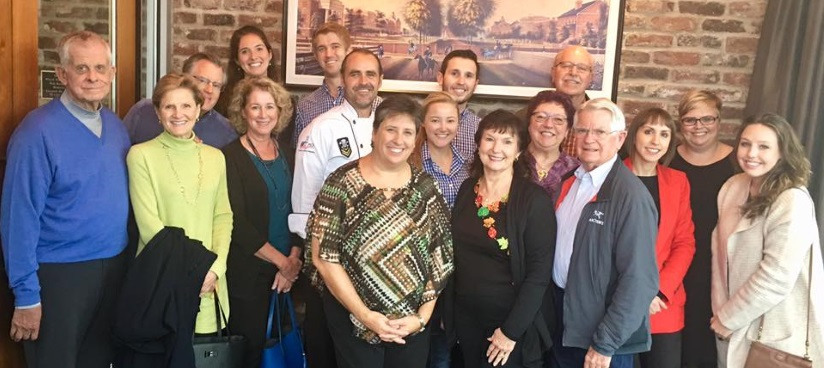January 18, 2019 | Erin Bluvas, [email protected]
One of the first things Julius Fridriksson did when he joined the Arnold School of Public Health in 2001 was to establish a weekly Stroke Survivor Support Group. The communication sciences and disorders (COMD) professor and SmartState Chair of Memory and Brain Function may be internationally renowned for his studies on cognitive health and aphasia, but he knows that research is only part of the equation.
“Stroke can have devastating effects on quality of life,” says Fridriksson, who directs the Aphasia Laboratory, where he researches brain health and post-stroke communication problems while treating people with aphasia through clinical trials and other studies. “Although the focus of our research program is on generating research that has global implications for patients, we have always emphasized community outreach to directly impact the lives of South Carolinians.”
When Fridriksson received an $11.1 million P50 grant from the National Institutes of Health to create the Center for the Study of Aphasia Recovery (C-STAR) in 2016, he used the opportunity to boost both his research activities and his team’s efforts to engage and support patients and family members outside the Lab. C-STAR immediately began hosting a lecture series to exchange ideas among experts in the field, with some of the events designed to educate speech-language pathologists as well as the patients and caregivers.
Over the past two years, the Aphasia Lab has continued and expanded these community outreach activities to include several additional opportunities for patients and their family members. In 2017, the team hosted their first annual Aphasia Lab Tailgate, which was featured by the National Aphasia Association.
This year, they hosted a tailgate before the USC vs Chattanooga game in November. Attendees enjoyed refreshments as well as games, such as Jenga and corn hole. The event was made possible through a sponsorship from Able South Carolina, a center for independent living that provides a variety of free services, including advocacy, peer support, transitional programs and referrals as well as educational programming for organizations aiming to become more inclusive.
November also saw the Lab’s first Lunch Bunch event, a monthly series for people with aphasia and their caregivers hosted at restaurants interested in learning more about how to better serve people with communication difficulties. The November Lunch Bunch event was held at 1801 Grille on campus, and the December event was held at Grecian Gardens in West Columbia. In addition to providing a monthly opportunity for people with aphasia and their family members to socialize with others going through the same experience, the series also aims to educate local restaurant managers and staff on how to make their restaurant more accessible to people with communication and physical disabilities while compiling a list of aphasia-friendly restaurants in the area.
The Lunch Bunch series is a part of a larger Caregiver Support Group, which is being organized by COMD doctoral student Lynsey Keator. While still in the planning stages, this group will kick off in early 2019 and include events such as cooking classes, exercise events and more.
“My hope, through this program, is to offer monthly sessions for caregivers to meet with other professionals from interdisciplinary backgrounds—social workers, psychiatrists, neurologists, and others—to learn about local resources for stroke survivors and to share their experiences with others,” says Keator. “Furthermore, this group will provide community and social opportunities to engage participants with aphasia, caregivers, and family members with aphasia, caregivers, and family members in events on campus and around Columbia.”
Playing with Words: An Aphasic Drama Group also begins in 2019. COMD associate professor Dirk den Ouden and associate professor of theater and dance Peter Duffy, along with students of speech-pathology, linguistics and theater and dance, are collaborating to offer free weekly 90 minute meetings beginning this month that culminate in a stage performance in May. Inspired by research at the Rehabilitation Institute of Chicago and others, this group is based on the premise that participating in drama exercises and theatrical performances can improve people’s language skills and boost confidence in their use of language and communication.
“Having aphasia can be frustrating because communication seems to rely so much on the ability to speak and understand spoken language,” says Den Ouden. “However, communication is much more than spoken language. Theater and drama make maximum use of this fact, where people can express themselves not only through words but also through gesture and mime, using all the tools they can find.”
These community outreach and support efforts complement the groundbreaking rehabilitation efforts conducted inside the lab. The Aphasia Lab is committed to these activities to ensure the best recovery outcomes.
“Over the years, hundreds of stroke survivors with aphasia have received free rehabilitation as part of our research,” says Fridriksson. “Our outreach efforts have extended the impact of our work to directly improve the quality of life among stroke survivors who live in the local community.”
Join us! We welcome individuals who have aphasia and their family members to participate in these community groups. Please use the contact information below to learn more.
